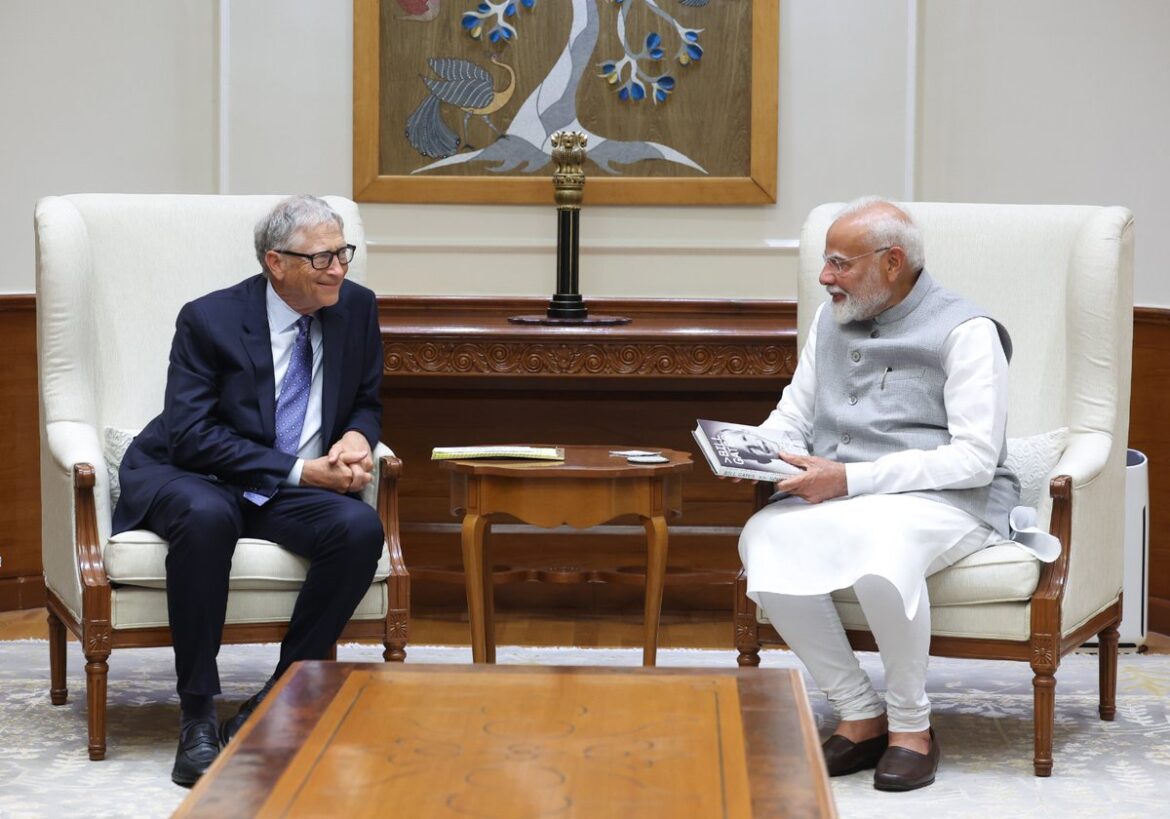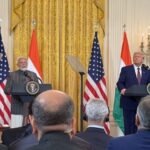Microsoft co-founder Bill Gates met with Indian Prime Minister Narendra Modi in New Delhi on March 19, 2025, to discuss India’s vision of achieving developed nation status by its centenary in 2047.
After the meeting, Gates described the conversation with PM Modi as insightful, highlighting India’s progress in health, agriculture, AI, and other transformative sectors. “It’s impressive to see how innovation in India is driving progress locally—and globally,” he noted.
PM Modi responded, calling it an “excellent meeting” where they discussed technology, innovation, and sustainability to build a better future.
Gates is in India as part of the Gates Foundation’s 25th-anniversary celebrations. During his visit, Gates is engaging with government leaders, scientists, and philanthropists shaping India’s health and development landscape. He has met with Foreign Minister S. Jaishankar, Finance Minister Nirmala Sitharaman, Health Minister J.P. Nadda, Agriculture Minister Shivraj Singh Chauhan, Andhra Pradesh Chief Minister Chandrababu Naidu, and former Foreign Secretary and Indian Ambassador to the United States, Harsh Shringla, among others.

Shringla, who was also Chief Coordinator of the G20, expressed admiration for the Foundation’s efforts and its contribution to India’s development, particularly its support for the Darjeeling Welfare Society aiding tea garden workers.
In an article, on March 14th, before heading to India, Gates emphasized the significance of hosting the Foundation’s Board of Trustees meeting in the Global South for the first time, stating, “India is the right place for this milestone.” Visiting India for the third time in three years, Gates praised the nation as a place where “big challenges meet even bigger ambitions,” citing its rapid advancements in public health, agriculture, and technology.
“And I come away with new ideas, because India is full of smart, ambitious people tackling some of the world’s hardest problems in creative ways,” he added.

Expanding on the Foundation’s work, Gates highlighted that it has been active in India for over two decades, collaborating with the government, researchers, and entrepreneurs to drive advancements in health and development.
According to him, India now hosts some of the most impactful programs the Foundation has contributed to, spanning “disease eradication, sanitation, women’s empowerment, and digital financial services.” This trip, he noted, offers an opportunity to assess what’s working, what’s evolving, and what’s next for both India and the Foundation.
Reflecting on the past, Gates pointed to India’s remarkable track record in public health as a testament to what’s possible.
“When I visited in 2011, it was one of the last places in the world still fighting polio. But that year, after relentless effort, India recorded its last case—and it’s remained polio-free ever since. Avahan, the HIV prevention program launched by the Gates Foundation two decades ago, is another success story,” he said noting India’s progress on the health front over the years. “It pioneered a community-led approach to reduce infection rates that complemented the government’s efforts in high-prevalence states; eventually, management of the program transitioned to the Indian government, becoming part of the country’s broader health strategy.”
A similar model, leveraging local leadership, innovative solutions, and data-driven insights, is now propelling India’s fight against tuberculosis. While the country bears the world’s highest TB burden, its investment in “new diagnostics, AI-powered detection tools, and improved treatment strategies is accelerating progress toward elimination,” he noted.

Gates also credited India’s achievements in childhood immunization as a key reason for his eagerness to return and learn more. In recent years, he emphasized that the country has significantly expanded routine vaccination programs, ensuring widespread access to essential childhood vaccines. Digital dashboards now track vaccine coverage, monitor cold storage, and enhance maternal and child healthcare, contributing to lower mortality rates and a more resilient health system.
Beyond immunization, India’s leadership in global health is reshaping approaches to diagnostics and treatment for infectious diseases. As a result, according to him, the country has emerged as a global leader in low-cost vaccine manufacturing, ensuring life-saving vaccines reach populations worldwide. Indian companies are also tackling another critical challenge: making diagnostics more affordable.
“One effort I’m following closely is the push to make a saliva-based TB test for under $2, which could help millions of people in India and globally detect the disease earlier and get treatment faster,” he added.
In addition to its healthcare advancements, Gates lauded India’s digital transformation. He mentioned that he had previously written about how digital public infrastructure, such as Aadhaar and India’s digital payments system, has made banking, healthcare, and government services more accessible to millions.

Now, Gates pointed out that India is using AI-powered tools to help rural health workers improve early disease detection, optimize pregnancy care, and manage patient data more efficiently.
He also underscored AI’s transformative impact on agriculture, recalling his visit to Odisha last year, where he saw firsthand farmers using AI-powered tools to predict weather patterns, choose crops, and reduce disease risks. “I’m looking forward to seeing how much better those tools have gotten in the short time since,” he noted.
Looking back at India’s G20 Presidency in 2023, Gates noted that PM Modi had pledged to share Indian innovations and expertise to tackle global development challenges.
“That’s exactly what’s happening,” he observed underscoring from vaccine manufacturing to AI-powered diagnostics, India’s solutions are reaching the world. He went on to state that Indian companies are producing TB tests with the potential to be game-changers in Africa. India is also developing AI models to support farmers across Asia. And they’re proving that digital technology can make healthcare more efficient, especially for the most vulnerable.
Describing India as an “incredible partner,” in addressing global challenges, Gates praised the country’s deep expertise and commitment to developing and scaling new ideas.
While acknowledging ongoing challenges, including the fight to eliminate TB, improving nutrition, and expanding access to AI-driven health and development services, Gates remained optimistic.
“But India has shown time and again that progress happens when innovation, local leadership, and investment come together. I always leave India inspired. I know this trip will be no different,” he added.






